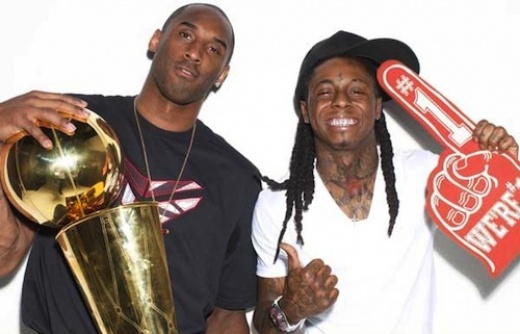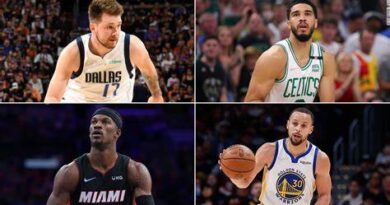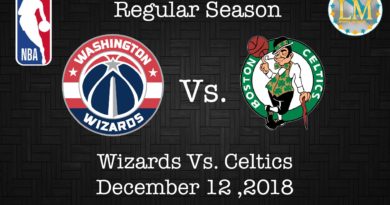Conclusive Culture:Chapter 3 Kobe Bryant/Dwayne Carter Jr. (Lil Wayne)
By:LaMonte Thomas
Headline Photo Credit: Blavity
Ch – 3: Kobe Bryant/Dwayne Carter Jr. (Lil Wayne)
Every now and then a figure in entertainment emerges to shift the culture, and society as we know it. Sports and music have the ability to unify the masses, and both industries unveil a passion that is unattainable by another source. Throughout history athletes and musicians alike contribute similar, life-altering influence on the way we perceive, engage and experience life’s moments. Modern-day artist Aubrey Graham (A.K.A Drake to the music industry) put it best by saying, “I swear sports and music are so synonymous/cause we wanna be them, and they wanna be us”. From someone who succeeds in the business on both sides, the lines from the record Thank me Now alludes to the timeless cultural access levied by the chosen few. As the influence from music and sports on culture is undoubtedly special, when paired together these eminent entertainers relate to each other’s social contributions. This measurement of cultural influence pairs music artists and athletes by persona and their methods of impact.
Persona- Generational Leader/Spokesman
Influence- Trend Setters/Monumental Work Ethic
Photo Credit: People.com
Kobe Bryant
Millennials grew up watching Kobe Bryant in the NBA as he grew up in the league before our eyes. During the NBA draft of 1996, he may not have been old enough to sign his own contract; fast forward 20 years and his face may belong on the Mount Rushmore of historical professional athletes. Since Kobe emerged on the scene as a young talent he has impacted African American culture. Bryant’s entire coverage from his posters sporting his infamous afro, his hip-hop music career (though basketball was definitely is calling), to world-renown commercials and documentaries invaded American pop-culture’s timeline.
His consecutive championships from 2000-2002 with one of the country’s most endearing franchises (Los Angeles Lakers) illuminated his spotlight and kept him in plain sight of the public eye. Like many celebrities he hit a pivotal criticizing moment in his career, a sexual assault case in 2003 that was later dropped and settled as a civil matter. Although the situation left him heavily scrutinized, Kobe Bryant’s career would further blossom into a folklore-like experience that millennials will forever appreciate.
In 2005 Kobe Bryant began to distinctly implant himself in cultural significance by way of amazing accomplishments on the court. On December 20 in 05’ Kobe outscored the entire Dallas Mavericks team 62-61 through three quarters of play. Just over a month later on January 22, 2006 he scored 81 points vs the Toronto Raptors; the second most ever in the NBA behind Wilt Chamberlain. From these moments on Kobe also known as the “Black Mamba,” continued to keep viewers at the edge of their seats; accomplishing feat after feat en route to five total NBA championships. Each year Bryant’s passion for the game would explode like a drama in vibrant capacity, proving him to be atop basketball’s greatest talent in the world. Notable accolades such as scoring 40 or more points in 4 consecutive games had the world believing there was nothing he couldn’t do. The fact that he accomplished these numbers six times perhaps had the world believing there was nothing he had not done. In his later basketball career, Kobe reinvented himself in the physical sense by switching his jersey number to 24 and in methodical fashion with his recurring excellence; gaining admiration from those who disliked him throughout his entire career. As he climbed in age and battled numerous injuries, his notoriety for perseverance and determination also elevated to iconic levels. As only Bryant could, his last game on April 13, 2016 ended with him scoring 60 points vs the Utah Jazz; a mark that only 25 players have ever reached.
His retirement letter entitled “dear basketball” was addressed to the game itself; winning an Oscar for the short-film that was inspired by the Player’s Tribune piece. In the end both of his jersey numbers eight and twenty-four were retired by the Lakers, and his every memory contributes to the energy of the Staples Center today; and beyond.
Video Cred: Deportes Al Fin
Photo Credit: Articlecube.com
Dwayne Carter Jr. “Lil Wayne”
Hip-hop music has been all the artist has known since nine years old, when he signed a deal with “Cash Money Records” in 1991. The rapper from New Orleans, Louisiana grew up in the Hollygrove neighborhood, one of the area’s most underprivileged areas. Wayne mentioned in an interview that although he was a Jr. he did not want to go by his father’s name. This influenced him to keep the “D” absent from his name, being that his father was absent from his life; thus birthing his hip-hop persona “Lil Wayne.” As the youngest member of the “Hot boys” Wayne contributed to their number one Hip-Hop and R&B album before releasing his solo album in 1999 which received platinum status. In the years to follow, Wayne and number one records would become expected; references as “the best rapper alive” gave the artist potential to sell “A Milli” with every release.
Dwayne Carter has injected his dna into American culture more times than we can count. Giving us terms and phrases like “bling” and “drop it like it’s hot” brought his style and culture into every household. In 2005 he founded his own recording label “Young Money Entertainment,” and hip-hop music found his prodigious impact to be infectious and innovative for the genre. Though his album “The Carter III” sold a million copies within the first week, his mixtapes were proving to the music world that his commitment to the craft was unparalleled. “Weezy” produced roughly eight mixtapes from 2005-2007, dropping rap’s hottest content which appeared effortless to him. These collections of “re-mixes” and underground tracks were considered to be album-quality, but he simply called them “gifts to the fans.” Wayne clearly set precedent for the the hip-hop mixtape (especially solo artists), increasing their clout and popularity. He is also praised as a featured artist; having contributed to roughly 130 top-100 billboard hits, the most of any rapper. Wayne puts his impact on American culture in perspective on his track John stating, “If I die today, it’d be a holiday.”
Cultural Influence- Kobe Bryant x Lil Wayne
Both Kobe Bryant and Lil Wayne can be known as the generational prototype for basketball and hip-hop, respectively. There was a period in time when Kobe Bryant was basketball, and Lil Wayne was hip-hop. These trend-setters are not only staples in the game, but revolutionaries in terms of work ethic and career longevity. Wayne and Kobe are also linked by contributing a large amount of their cultural influence at the same time. Kobe averaged 35.4 points during the 06-07 season (fifth highest ever); in the the same time-frame Wayne released eight mixtapes that changed rap forever. While Kobe Bryant has played in 1,346 NBA games, Lil Wayne has contributed to 1,757 songs as of October 2017. Wayne has referenced relating to Kobe on several occasions. One notable incident of such relation came on his rendition of the Jay-Z track “Show Me What You Got.” Wayne’s verse on this track has a parallel comparison of basketball greats with those of hip-hop. First Wayne compares Jay-Z to Michael Jordan, and himself to LeBron James, a suggestion of the “passing of the torch.”
“When it comes down to this recordin’/
I must be LeBron James if he’s Jordan!”…Then the homage to Kobe Bryant emerges
“No I want rings with my performance/
I’m more Kobe Bryant of an artist!
Same coach same game been starting/
Same triangle offense!”
The lyrics set the music world ablaze. As many rumors circled that Wayne would sign to Jay-Z after he became President of Def Jam, fans of both icons were given a taste of what that could be like. (Similar to the anticipated LeBron/Kobe NBA finals we never saw in 2009)
Apart from mentioning the likeness of careers here and there, Wayne made an entire song dedicated to the NBA phenom, entitled Kobe Bryant.
Video Cred: Brandon Burgess
Since 1996 American culture was turned on its axis by the forces known as Kobe Bryant and Dwayne (Lil Wayne) Carter Jr. The likes that we have seen the last of their effects are far from definite. Look into the American culture’s definition of perseverance, determination, and black excellence, and you will find Kobe Bryant and Lil Wayne.





